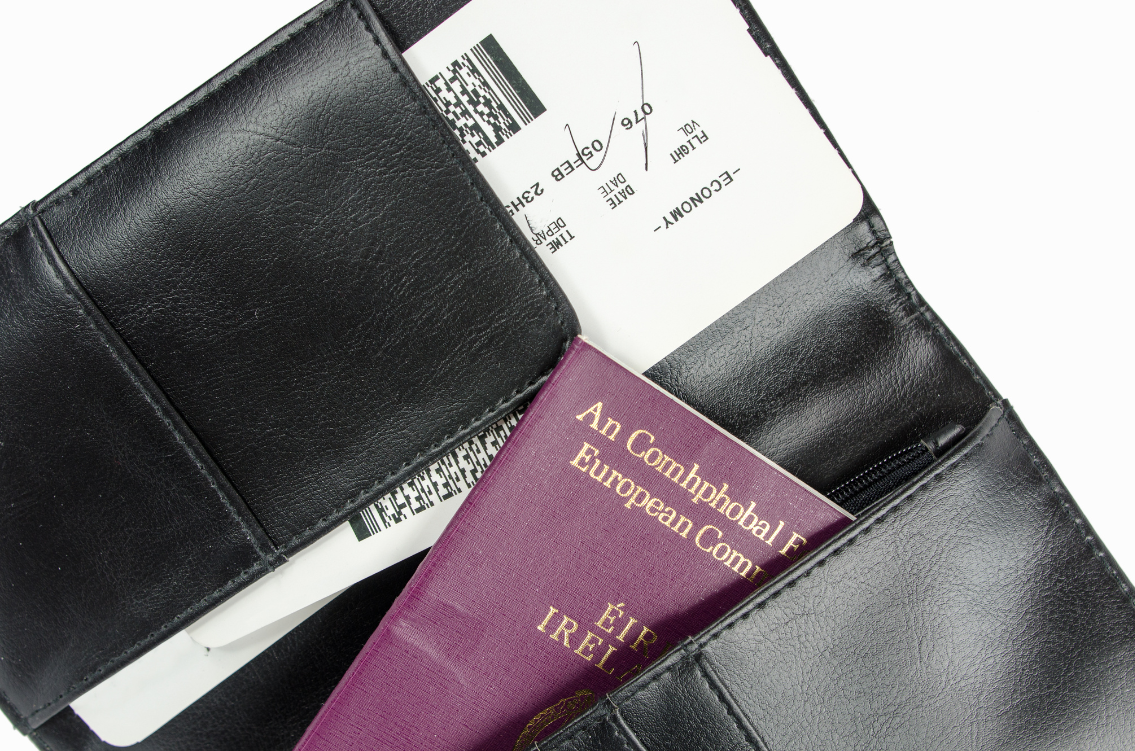We’ve all done it at some point in our lives. We open the drawer, file, box, or pocket expecting to find our passports, only to discover that it’s not there. Fear shoots down the spine, the mind begins frantically racing, and muscles around the body contract with tension - where on earth is the passport?
Misplacing - or even losing a passport is a frustrating, nerve-wracking situation, made all the worse if you have an impending holiday on the horizon - or you are away at the time.
Having a thorough search is the first step, but if it gets to the point where you need to admit it can’t be found, you will have to move on to Plan B. Here are your next options.
Immediate Steps After Losing Your Passport
When that sinking feeling finally becomes a reality, it’s important to stay calm. Freaking out never helps a situation, so keep your cool and work through the following steps.
Keep Calm and Start Searching
Most people have a safe place where they keep passports, but we all, at some point, forget to put them back.
The first rule: Stay Calm. Chances are the passport is simply somewhere else in the house or place you are staying. Think back to the last time you used it. Did you put it in your rucksack as you were leaving the airport? Did you retrieve it to make a booking? Or perhaps you forget to put it back after returning from a holiday. Here are some of the most common places we tend to leave our passports:
- Luggage compartments
- Carry-on bags
- Clothing pockets (items that you travelled in)
- Bags containing items bought at the airport
- Desks - particularly around a computer
- Previously visited locations
Secure Your Personal Information Immediately
Searching properly is vital because once you start the process of getting a new passport - which essentially cancels your old one - you’re going to feel a little stupid when you find it in the inside pocket of your jacket that you wore on the plane.
However, there does come a point where you’ve looked everywhere and contacted any previously visited locations but still can’t find it. At this stage, you need to consider whether your passport may have been stolen.
If this is the case, act quickly to secure your personal information. This might involve cancelling credit cards, altering online passwords, and monitoring your accounts for unauthorised activity. Sadly, identity theft is on the rise, so if you think you’ve been a victim, contact your bank, credit cards, etc, and also your local Garda station.
How to Report a Lost or Stolen Passport
Your next step is to report your lost or stolen passport, which is critical in preventing its misuse and starts the process of obtaining a replacement.
Notify your Local Garda Station & Obtain a Report
If you believe theft is the cause, you’ll need to file a report at the nearest Garda station - whether this is in Ireland or abroad. This report can be crucial for the passport replacement process, serving as official documentation of the incident.
One point we can’t overstate is the importance of obtaining a copy of the Garda report. This may be required when applying for a new passport or getting an entry stamp in your emergency passport to allow you to leave a foreign country. Ensure you have this document before leaving the Garda station.
Contact the Nearest Passport Office or the Irish Embassy
Once you have a Garda report, contact your local passport office or the nearest Irish embassy or consulate. Informing them of your situation is vital as they will invalidate your lost passport to prevent fraudulent use and guide you through the replacement process.
How to Apply for a Replacement Passport
The process of applying for a replacement passport vastly differs depending on whether you’re in Ireland or abroad. However, both involve gathering the necessary documentation and completing the application process meticulously.
Gather Required Documents for Application
Start by collecting all the documents needed for the application. This typically includes:
- Proof of identity
- Citizenship (such as a birth certificate)
- Garda report if your passport was stolen.
Complete the Online Application or Paper Form
The Passport Service offers both online and paper applications. Choose the most convenient method for you, ensuring that all information provided is accurate and complete. Please note that the process is significantly quicker online (between 10 and 20 days) than with paper documents (currently around 8 weeks).
Submit Application with Fee and Supporting Documents
Submit your application along with the required fee and any supporting documents. Accuracy and completeness are crucial to avoid delays in processing your new passport.
How to Get an Emergency Travel Document
In cases of urgent travel, you may qualify for an emergency travel document, which will allow you to travel immediately but typically won’t cover the usual 10-year passport cycle.
Determine Eligibility for Emergency Documents
Emergency travel documents are issued under specific circumstances. These include:
- A death or funeral of immediate family members abroad
- Urgent medical attention abroad
- If you’re stranded abroad
- If you have a refugee status
Assess your situation to determine if you meet the eligibility criteria and consult with the nearest Irish embassy or consulate. Remember that applications to travel for medical treatment will need to be verified with documentary evidence from a GP or a consultant.
You should also email INISTravdoc@justice.ie to let them know that you have applied and to explain the reason for the urgency. It’s important to stress that having a holiday in a few days is not considered an emergency.
Contact the Department of Foreign Affairs or the Nearest Embassy
Contact the Department of Foreign Affairs or your nearest embassy for an emergency travel document. They will provide you with the necessary guidance and forms to complete.
Provide Proof of Emergency and Identity
Be prepared to present thorough evidence of your emergency and sufficient identification. This might include a Garda report, travel itineraries, and other relevant documentation proving your emergency need.
How to Manage Affected Travel Plans When Losing a Passport
A lost passport can severely disrupt your travel plans. Here are steps to manage the situation effectively.
1. Inform Your Airline and Accommodation Providers
Contact your airline and accommodation provider immediately to inform them of your situation. Many companies offer flexibility in such circumstances, allowing you to rebook or cancel your reservations.
2. Check with Your Travel Insurance for Coverage
Review your travel insurance policy to see if it covers incidents like passport loss. If covered, follow the insurer's process to file a claim.
3. Explore Alternative Identification for Domestic Travel
For domestic travel within Ireland, other forms of identification like a driving licence or government-issued ID might suffice. Check with your travel provider to confirm acceptable forms of ID.
One long-standing myth we should squash right now is whether Irish citizens can fly to Europe with only an ID card. The answer is a firm no. Ireland is not part of the Schengen Zone, so any Irish citizen entering mainland Europe requires a valid passport.
Government Assistance When Losing Your Passport Abroad
Irish citizens abroad have access to government assistance in case of passport loss.
Reaching Out to Irish Embassies for Support
Losing a passport abroad can be terrifying, but it’s important to remember that you’re never completely alone. Irish embassies and consulates around the world can provide invaluable support and guidance while assisting in the process of securing a replacement passport or an emergency travel document.
The Importance of Copies for Identification and Documentation
Keeping copies of your identification and travel documents can be a lifesaver. Store them securely, either as digital copies in a cloud service or as physical copies in a separate location from your original documents.
Qualifying for an Emergency Passport
Emergency passports are issued under specific conditions but are generally easier to get when you’re out of the country trying to get back into Ireland. While outside the country, you’ll need to consult with the relevant authorities to determine if this option is viable.
Also, keep in mind that repeat offenders (those who repeatedly lose their passports) tend to receive a red flag. If you’ve lost 2 or more passports in the past, you may not be eligible for a standard 10-year passport, as this could point towards criminal intent.
What is the Replacement Passport Process Like?
Understanding the replacement process and timelines can help set your expectations and plan accordingly.
Standard vs. Expedited Replacement Timelines
The Passport Service offers standard and expedited processing options. Your choice will depend on how urgently you need the replacement. Be aware of the different fees and processing times associated with each option. Here’s a breakdown of costs and times:
Adult
- Standard 10-year passport - €75
- Large 66-page, 10-year passport - €105
- Passport Card - €35
- Standard passport plus Passport Card bundle - €100
- Large passport plus Passport Card bundle - €130
Child
- Standard 5-year passport for those under 18 years - €20
- Large 66-page, 5-year passport for those under 18 years - €50
- Standard 5-year passport plus Passport Card bundle for those under 18 years - €45
- Large 66-page, 5-year passport plus Passport Card bundle for those under 18 years - €75
*All these passports fall under the standard processing time of 10-20 days.
Expedited
| Service Type | Passport Fee | Same-Day Turnaround Appointment Fee | Four-Day Turnaround Appointment Fee |
| Adult renewal | €95 | €150 | €75 |
| Child renewal | €45 | €150 | €75 |
Emergency Passport Processing Times
Emergency passport applications are processed on a priority basis. However, the exact timeframe can vary depending on the specific circumstances and the workload of the processing office - but a timescale of less than three days is often mentioned.
How to Prevent Passport Loss
Of course, not losing your passport can prevent all of these steps. While it’s impossible to protect against all manner of circumstances, there are several steps you can take to help avoid passport loss.
1. Adopt Secure Storage Practices
When travelling, use secure storage options like hotel safes or secure, hidden compartments in your luggage. Always be mindful of where your passport is, especially in public places.
2. Use Tracking Technology
Consider using tracking technology such as RFID-blocking wallets or smartphone apps designed to keep tabs on valuable items like passports.
3. Maintain Digital Backups for Emergency Access
Digital backups of your passport and other essential documents can provide a crucial safety net. Use secure, encrypted services to store these backups for emergency access.
Plan Your Next Steps with 123.ie
If you have travel insurance with 123.ie, contact us, and we can assist you with your next steps and how to best minimise the impact. Depending on your coverage, we can help with travel document replacement and personal money to help you through this challenging period.
Losing a passport is a pain, there’s no other way to look at it, but you’re not alone. Contact your local passport office, contact us, and we’ll get you through it together.





